The Importance of Managing Anger for Emotional Health and Stronger Relationships
In my years as a psychotherapist, I've worked with countless individuals who struggle with anger—an emotion that, when unmanaged, can take a significant toll on both our emotional health and relationships. Anger is a natural and valid emotion, yet understanding and managing it is crucial for personal well-being and fostering healthy connections with others.
Understanding Anger: A Natural Emotion
Anger often gets a bad rap, but it is important to recognize that it is a natural human response. It signals that something is amiss, whether it’s an external threat, a personal boundary being crossed, or an internal conflict. In this way, anger can be a catalyst for change, pushing us to address issues we might otherwise ignore.
However, when anger is mismanaged, it can lead to a host of problems, including damaged relationships, poor decision-making, and a decline in mental and physical health. Learning to manage anger effectively is not about suppressing it but about understanding and expressing it in a healthy, constructive manner.
The Impact of Unmanaged Anger on Emotional Health
Unmanaged anger can wreak havoc on our emotional health. It can lead to chronic stress, anxiety, and depression, creating a cycle that is difficult to break. Physically, persistent anger can increase the risk of cardiovascular issues and weaken the immune system.
By learning to manage anger, individuals can break this cycle, reducing stress and improving overall emotional health. Anger management involves recognizing triggers, developing coping strategies, and expressing feelings in a way that is both assertive and respectful. These skills not only enhance emotional health but also increase self-awareness and self-control.
Anger and Relationships: The Cost of Losing Control
Relationships are often the first casualties of unmanaged anger. Whether it's a partnership, friendship, or family bond, uncontrolled anger can lead to conflict, resentment, and emotional distance. It can create an environment where others feel unsafe or undervalued, ultimately eroding trust and intimacy.
Effective anger management helps individuals communicate more clearly and calmly, preventing misunderstandings and fostering a more supportive and loving environment. By expressing anger constructively, individuals can address grievances without resorting to hostility or aggression, strengthening the relationship rather than undermining it.
Building Skills for Anger Management
Learning to manage anger is a skill that can be developed with time, patience, and practice. Here are some strategies I often recommend to my clients:
Self-Awareness: Recognize the physical and emotional signs of anger. This awareness is the first step in controlling your reactions.
Pause and Reflect: When you feel anger rising, take a moment to pause. Deep breathing or a short walk can provide the space needed to think before reacting.
Communication: Use "I" statements to express your feelings and needs without blaming or criticizing others. For example, "I feel upset when..." rather than "You always..."
Problem-Solving: Focus on finding solutions rather than dwelling on problems. This proactive approach can help you address the root causes of your anger.
Seeking Support: Consider therapy or anger management groups to gain additional insights and strategies. Sharing experiences with others can provide new perspectives and a sense of community.
Conclusion: A Path to Emotional Freedom and Healthy Relationships
Managing anger effectively is not just about avoiding conflict; it’s about creating a life where emotional health and meaningful relationships can flourish. By understanding and channeling anger constructively, we can transform it into a powerful force for personal growth and stronger, more fulfilling connections with those around us.
Remember, learning to manage anger is a journey, not a destination. It requires commitment, self-reflection, and compassion, both for yourself and for others. As you embark on this journey, know that you are taking a significant step toward emotional freedom and healthier, happier relationships.
This approach to anger management not only enhances your quality of life but also empowers you to engage more deeply and authentically with the world. If you feel overwhelmed, don’t hesitate to reach out for professional guidance. Together, we can navigate the complexities of anger and unlock its potential for positive change.
